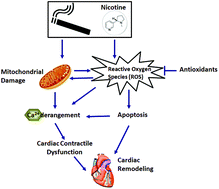Nicotine, cigarette smoking and cardiac function: an update
Abstract
Cigarette smoking is perhaps the unique modifiable risk factor for coronary diseases and the leading preventable cause of mortality in the United States. Although the impact of cigarette smoking on the onset and progression of atherosclerotic diseases is well established, the effect of tobacco, in particular cigarette smoking, on cardiac remodeling and contractile function is somewhat less defined. Ample evidence has shown a role for oxidative stress and interstitial fibrosis in long-term cigarette smoking-induced heart diseases with a pivotal pathological role of the main smoke component nicotine although other constituents of cigarette smoking such as carbon monoxide may also contribute to the generation of heart anomalies following cigarette smoking. This mini-review aims to summarize some of the recent findings relating to cardiac remodeling and contractile anomalies triggered by cigarette smoking, and to identify a pathophysiological mechanism through which cigarette smoking might compromise cardiac function.


 Please wait while we load your content...
Please wait while we load your content...